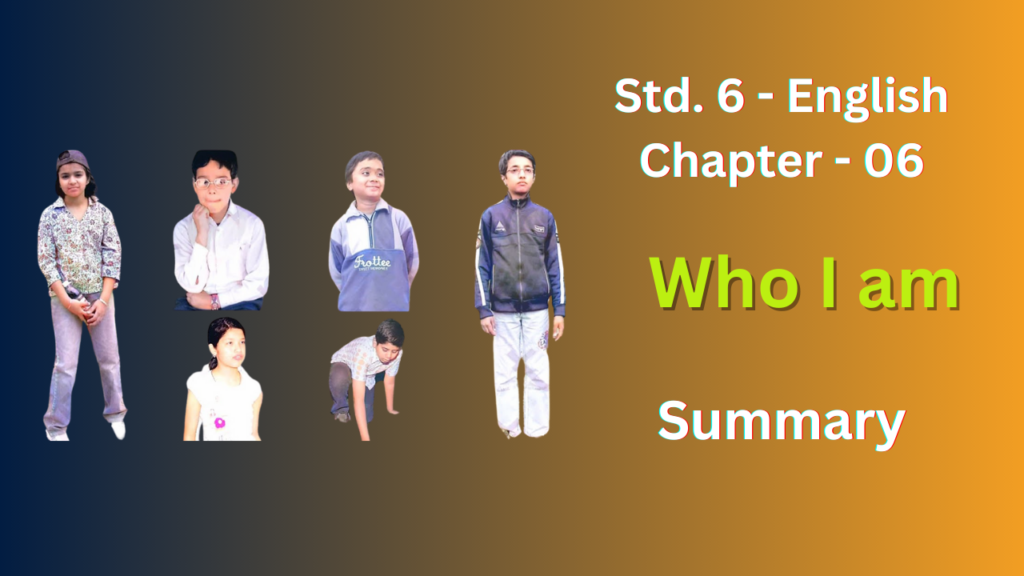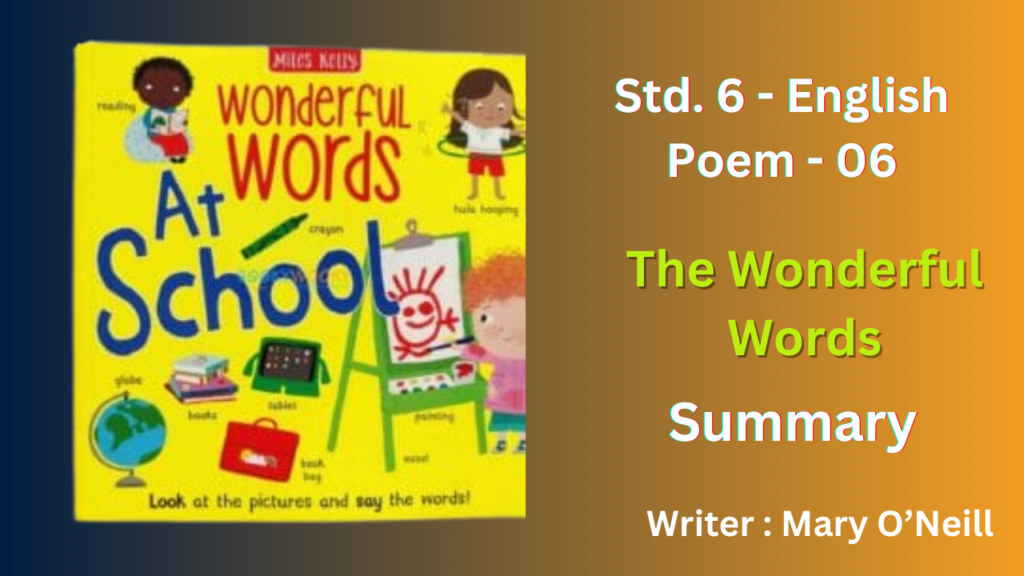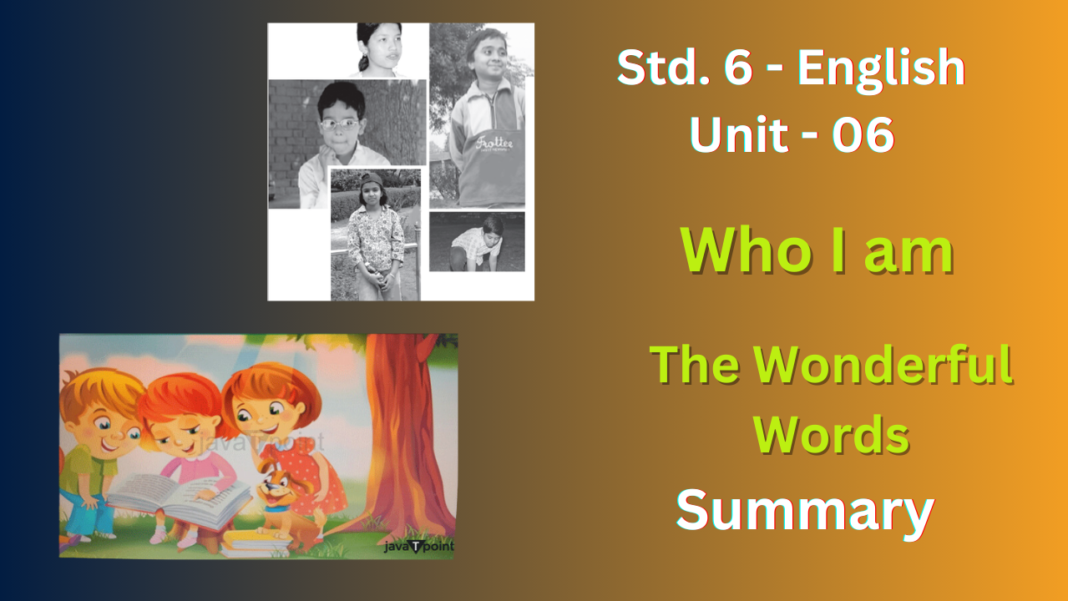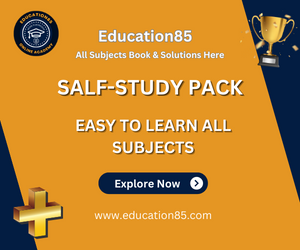NCERT Solutions for Class 6th English Chapter 6
Who I am
The chapter “Who I Am” NCERT Solutions for Class 6th English Chapter 6 is a collection of short descriptions about various characters, highlighting their unique personalities and aspirations. Here’s a summary:
- Focus: The chapter emphasizes the idea that everyone is different and has something special about them.
- Characters: The chapter introduces us to six characters:
- Radha: A young girl who loves climbing trees, finding joy and a sense of power in reaching the top.
- Nasir: A boy who lives in a village with cotton fields. He is interested in learning more about preserving seeds, showcasing his curiosity and commitment to his surroundings.
- Rohit: A travel enthusiast who dreams of going on a world tour, highlighting his adventurous spirit and yearning to explore new places.
- Serbjit: A responsible student trusted by his teachers and classmates, showcasing his leadership qualities.
- Dolma: An ambitious girl who dreams of becoming the Prime Minister, demonstrating her desire to serve the country and make a positive impact.
- Peter: A young boy who cherishes spending the second Sunday of every month with his family, enjoying outings to the cinema and ice cream, highlighting the importance of family time and simple pleasures.

NCERT Solutions for Class 6th English Chapter 6
Working With The Text :
Answer the following
1. Peter’s favourite day of the week is Sunday because_______
Ans : He enjoys a special family tradition on that day.
- Going to the cinema: They likely watch a movie together, creating a shared experience and bonding time.
- Eating peanuts: Enjoying snacks as a family during the movie adds to the fun atmosphere.
- Eating ice cream: This sweet treat after the movie might be a cherished part of their Sunday outing.
2. Nasir wants to learn___________________
Ans : How to preserve seeds.
3.Dolma believes that she can make a good Prime Minister because____
Ans : She wants to improve lives (hospitals, schools) and has big dreams for the country.
B.Write True or False against each of the following statements.
1.Peter is an only child. _________________________ .
2.When Serbjit gets angry he shouts at people. _____________________________
3.Nasir lives in the city. _________________________
4.Radha’s mother enjoys doing things with her. ____________________
Ans :
- False: We cannot say for certain if Peter is an only child. The text focuses on the family tradition but doesn’t mention siblings.
- False: There’s no mention of Serbjit shouting when angry. The text highlights his responsible nature and leadership qualities.
- False: The text mentions Nasir lives in a village with cotton fields, suggesting a rural setting.
- True: The text describes Peter enjoying outings with his family, implying his mother is involved in these activities.
Working With The Text
Fill in the blanks to name the different kinds of intelligence. One has been done for you.
When I enjoy listening to people ans solving their problems I use my interpersonal intelligence.
Ans :
- When I am good at numbers and solving math problems, I use my logical-mathematical intelligence.
- When I am good at sports and moving my body, I use my bodily-kinesthetic intelligence.
- When I can see things in my mind and imagine new ideas, I use my spatial intelligence.
- When I love music and can play instruments or sing, I use my musical intelligence.
- When I am good at understanding my own feelings and the feelings of others, I use my intrapersonal intelligence.
- When I am interested in nature and can identify plants and animals, I use my naturalistic intelligence.
Poem – The Wonderful Words
The poem “The Wonderful Words” celebrates the power of language and encourages expressing your thoughts clearly. Here’s a summary:
Importance of Expression:
- The poem emphasizes the importance of expressing your thoughts and feelings through words. It discourages keeping them bottled up inside because unexpressed thoughts eventually fade away.
Language as a Tool:
- The poem compares the English language to a game. Learning and using words is presented as an enjoyable and accessible activity.
Matching Thoughts and Words:
- The poet encourages the reader to find the perfect words to express their “brightest thoughts and curiosity.” This highlights the importance of clear and precise communication.
Unlocking Potential:
- The poem suggests that expressing your thoughts through words can unlock your true potential and lead to “marvellous new surprise[s].”
Don’t Be Afraid to Speak Up:
- The poem motivates the reader to overcome any hesitation or fear they might have about speaking up. It encourages boldness in expressing oneself.

NCERT Solutions for Class 6th English Chapter 6 poem – The wonderful words
1. With your partner, complete the following sentences in your own words using the ideas in the poem.
- Do not let a thought shrivel and die because ________________.
- English is a _______________ with words that everyone can play.
- One has to match _________________ .
- Words are the _______________ of thought.
Ans :
- Do not let a thought shrivel and die because you can’t find the right words to express it.
- English is a treasure chest with words that everyone can play.
- One has to match their brightest thoughts and curiosity with the perfect words.
- Words are the key to unlocking the magic of thought.
2. In groups of four discuss the following lines and their meanings.
1. All that you do is match the words
To the brightest thoughts in your head
2. For many of the loveliest things
Have never yet been said
3. And everyone’s longing today to hear.
Some fresh and beautiful thing
4. But only words can free a thought.
From its prison behind your eyes
Ans :
Line 1: All that you do is match the words
To the brightest thoughts in your head
- Meaning: This line emphasizes the simplicity of expressing yourself. It suggests finding the right words to accurately convey your most brilliant ideas and deepest thoughts.
- Discussion Points:
- Is finding the “right” words always easy?
- How can we improve our ability to express ourselves clearly?
- Are there different ways to express the same thought (e.g., using synonyms, metaphors)?
Line 2: For many of the loveliest things
Have never yet been said
- Meaning: This line suggests that there are countless beautiful thoughts and feelings waiting to be expressed. It encourages us to share these unique perspectives with the world.
- Discussion Points:
- Why might some people hesitate to share their thoughts and feelings?
- What are some ways to overcome this hesitation?
- How can language be used to create beauty?
Line 3: And everyone’s longing today to hear
Some fresh and beautiful thing
- Meaning: This line highlights the human desire to connect with others through new and inspiring ideas. It suggests that expressing unique thoughts can be enriching for both the speaker and the listener.
- Discussion Points:
- Why do people crave “fresh and beautiful things”?
- How can sharing new ideas contribute to a positive and stimulating environment?
- What are some examples of “fresh and beautiful things” people might long to hear?
Line 4: But only words can free a thought
From its prison behind your eyes
- Meaning: This line emphasizes the power of language in communication. It suggests that thoughts remain trapped within us until they are expressed through words.
- Discussion Points:
- How can unexpressed thoughts be like a “prison”?
- Are there other ways to communicate thoughts besides words (e.g., art, music)?
- Why is it important to “free” our thoughts and share them with others?
FAQ’S
What is the significance of “Who I Am” in NCERT Solutions for Class 6th English Chapter 6?
“Who I Am” delves into themes of self-discovery, identity, and self-expression, making it a pivotal component of the Class 6 English curriculum.
How does “The Wonderful Words” contribute to language learning in NCERT Solutions for Class 6th English Chapter 6?
“The Wonderful Words” introduces students to the beauty and power of language, enriching their vocabulary and enhancing their language skills through engaging storytelling.
What lessons can students learn from “Who I Am” and “The Wonderful Words” in NCERT Solutions for Class 6th English Chapter 6?
Through “Who I Am,” students can explore concepts of self-awareness, acceptance, and embracing individuality, while “The Wonderful Words” teaches the importance of language, communication, and the impact of words on our lives.
How do “Who I Am” and “The Wonderful Words” encourage creativity and self-expression in students?
Both texts inspire students to express themselves authentically, fostering creativity, imagination, and confidence in their ability to articulate their thoughts and feelings effectively.
Are there any real-life examples or experiences that resonate with the themes of “Who I Am” and “The Wonderful Words”?
Students may relate their personal experiences of self-discovery and the power of language to communicate ideas, emotions, and experiences, reflecting the themes explored in these texts.









